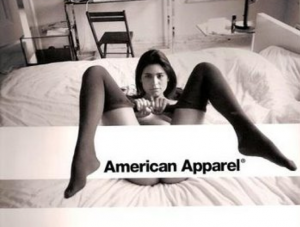In this advertisement by American Apparel we can see a young woman in a bedroom setting, lying on the bed wearing what appears to be nothing but a pair of over-the-knee socks, with the brand’s logo and a broad  white stripe preserving at least some of her modesty. The image is overtly sexual which is hardly surprising considering a quick search online revealed many more American Apparel advertising campaigns that are of similar ilk, some even more overtly sexual and some even starring actual porn stars. This image itself could be perceived as pornographic as the angle of the photographer could be seen as the view of a lover taking sexual images of their partner. However, the fact that this seemingly intimate moment is an advert, is published and can be viewed by the general public, gives the feeling of revenge porn or some such; although we know that it isn’t, this is the impression I get when looking at the image, that something private has been made public.
white stripe preserving at least some of her modesty. The image is overtly sexual which is hardly surprising considering a quick search online revealed many more American Apparel advertising campaigns that are of similar ilk, some even more overtly sexual and some even starring actual porn stars. This image itself could be perceived as pornographic as the angle of the photographer could be seen as the view of a lover taking sexual images of their partner. However, the fact that this seemingly intimate moment is an advert, is published and can be viewed by the general public, gives the feeling of revenge porn or some such; although we know that it isn’t, this is the impression I get when looking at the image, that something private has been made public.
American Apparel is well known for its controversial advertising, with some of their adverts having been banned in certain countries as they were deemed too sexual and some even “seeming to sexualise a child” (Sharkey, 2015). They certainly do use very young-looking women in sexual poses in their advertising, seemingly thinking that that’s what will sell their product. However, sex does not always sell, as in an interview with The Telegraph Professor Brad Bushman said, “Sex and violence do not sell, and in fact they may even backfire by impairing memory, attitudes and buying intentions for advertised products. Advertisers should think twice about sponsoring violent and sexual programmes, and about using these themes in their ads.” (Bushman, 2015). I agree with this as personally their overly sexually suggestive adverts puts me off the brand and would make me think twice about entering a store and buying their product. The man behind the brand, Dov Charney – atop of his highly controversial advertising campaigns – has been accused several times of sexually harassing his staff and sending them inappropriate messages (Freeman 2017); therefore, it is unsurprising his adverts put forth such a degrading and inappropriate message to his largely teenage customer.
American Apparel are not the only brand that has relied on ‘sex’ to sell their product, with Calvin Klein having also come under fire for using highly sexualised imagery in their advertising campaigns. Calvin Klein has been quoted as saying, “I’m not selling sex. I’m selling underwear and jeans, and I’m not trying to do it with pornography.” (Farfan 2017) in response to claims he too was using sexualised imagery as a marketing tool. However, I feel as though Calvin Klein’s adverts are not as offensive because they are targeted towards a slightly older market and are almost tastefully sexual and artistic rather than straight up pornographic like American Apparel’s campaigns, and that is why – combined with their younger market- it seems so much more inappropriate for American Apparel to advertise their clothing in this highly sexualised way.
- Sharkey L., The Independent, (2015), ‘American Apparel Gets Another Ad Banned by Advertising Watchdog for Sexualising Children’. Available from: http://www.independent.co.uk/life-style/fashion/news/american-apparel-gets-another-ad-banned-by-advertising-watchdog-for-sexualising-children-10116040.html (accessed 30/11/17)
- The Telegraph (2015), ‘Sex Sells? It can make you forget what is being advertised, say scientists’. Available from: http://www.telegraph.co.uk/news/shopping-and-consumer-news/11754878/Sex-sells-It-can-make-you-forget-what-is-being-advertised-say-scientists.html (accessed 30/11/17)
- Freeman H., The Guardian (2017), American Apparel founder Dov Charney: ‘Sleeping with people you work with is unavoidable’ . Available from: https://www.theguardian.com/lifeandstyle/2017/sep/10/american-apparel-dov-charney-sexual-harassment (accessed 30/11/17)
- Farfan B., The Balance (2017), ‘Calvin Klein Quotable Quotes About Marketing Sexuality, Sexy Brands’. Available from: https://www.thebalance.com/calvin-klein-quotes-about-marketing-sexuality-2892507 (accessed 30/11/17)
